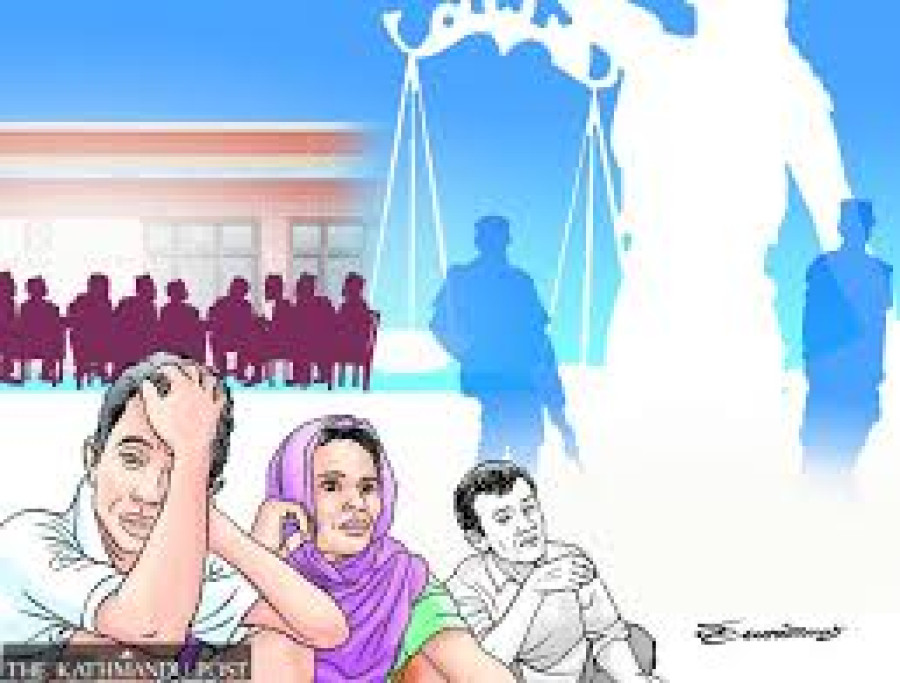National
Insurgency victims divided over timing of law amendment
A group says amendment first, another urges swift appointment of office bearers to two commissions.
Binod Ghimire
Differences between insurgency victims over the transitional justice process are not new. But the discord was mostly private—until recently.
Now, conflicting positions of two groups of victims on the implementation of a recent Supreme Court verdict have brought these differences out in the open. On March 12, the top court had ordered the government to start selecting office bearers in the two transitional justice commissions—the Truth and Reconciliation Commission, and the Commission of Investigation on Enforced Disappeared Persons—within a month.
Until the office bearers are appointed, the court had asked the government to constitute task forces within the commissions to carry out preliminary investigations into the victims’ complaints.
Ten days later, a group of insurgency victims, in a meeting at the Prime Minister’s Office, said the government must endorse the bill to amend the Enforced Disappearances Enquiry, Truth and Reconciliation Commission Act before taking any decision on transitional justice.
Any move made without the amendment is unacceptable, warned the victims organised under the Conflict Victims Common Platform and the Conflict Victims National Network among two dozen other organisations. Suman Adhikari and Gopal Shah led the group.
However, on March 27 another group of the victims led by Bhagiram Chaudhary of the National Campaign for the Truth, Justice, Reparation, Memorialisation and Social Justice, met Prime Minister Pushpa Kamal Dahal demanding the government start a process to appoint office bearers in the two commissions, as per the recent court ruling, while the law amendment process continues.
It urged the prime minister to start the selection process within the court’s deadline using its authority to ‘remove difficulties’. Section 42 of the Act authorises the government to remove difficulties.
“The authority to remove difficulties is a legal loophole which should not be used to take serious decisions. It will open the door for the executive’s influence in the entire transitional justice process,” Shah told the Post. “Anyone who is genuinely concerned about justice for the victims would never make such a demand.”
In line with the Adhikari and Shah-led victims group, the Accountability Watch Committee, an association of human rights defenders, on Monday presented a memorandum to the law minister and the attorney general saying the Act’s amendment is their bottom line. The committee said that the top court on different occasions has reminded the government to amend the Act and the March 12 court verdict is also aimed at the same.
“It would be unilateral understanding of the verdict to claim that the appointment process can begin without amending the Act,” reads the memorandum by the committee.
The Chaudhary-led group, however, wants the appointment process to commence based on the existing Act as the amendment doesn’t seem possible within the court’s deadline.
“We are not against the amendment. However, the demand for amendment before the selection process begins is akin to asking the government to breach the top court’s month-long deadline,” Chaudhary t0ld the Post.
He accepted that his approach for transitional justice is different to the other group. However, our ultimate goal is the same, he said. “In light of the struggle of thousands of victims for survival, right now we are prioritising reparation over everything else. Others are focusing on prosecution over relief and reparation,” he said. “We are not against prosecution, but that is not the first priority.”
The Chaudhary-led group has been claiming that scores of victims need immediate health care, jobs, monetary support and education, which is possible if reparation gets the top priority. Putting prosecution before other pillars of transitional justice would only delay the process.
But human rights activists find Chaudhary’s approach problematic. They say transitional justice is a holistic process where all of its pillars—truth, justice, reparation, memorialisation, and guarantee of non-occurrence—should get equal priority.
“The demand of Chaudhary’s group directly or indirectly favours the perpetrators. Differences among the victims had never been so visible,” Charan Prasai, a human rights defender, told the Post. “The division will only weaken the call for justice, something that those in power have always wanted. No action that favours the perpetrators can be in the interest of the victims.”
He said revision of the Act is a precondition for a credible selection process.
The two commissions have been inactive since July 2022 after the government decided to extend their terms without retaining their chairmen and members. Against the government’s previous claims that the bill to amend the existing transitional justice law would be endorsed by October 2022, which would also have opened the door for recruiting new office bearers, there has been no progress.
While the truth commission has received 63,718 complaints, the disappearance commission is sitting on around 2,400 cases.
“If the parties have the willpower, the Act can be amended in a few days. If they really want, there is still time to start the selection process within the court’s deadline even after the amendment,” said Shah.




 18.12°C Kathmandu
18.12°C Kathmandu














